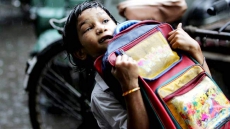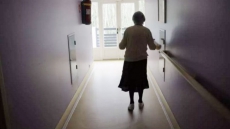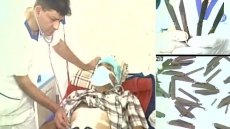TORONTO — Islam Lazakani is eager to show off her budding photography skills.
The chatty 13-year-old Syrian refugee flips through a smartphone, pointing out unusual colours and angles that caught her attention while wandering the streets of Toronto, her "second" home.
She's collected hundreds of images as part of a photography project involving 25 newcomers, and she beams while snapping pictures with a group that includes her older brothers Nour and Mohamad and other refugees from Iraq, Kuwait and Saudi Arabia.
"We know how to take pictures but not so good like this," Lazakani says.
It's a welcome distraction from the turmoil that has dominated much of her life, and the ongoing challenges of adjusting to a strange country.
Organizer and photographer Gilad Cohen says he hopes the project can offer a creative outlet during a key time in these youngsters' lives, noting the program is meant to break barriers, build self-esteem and combat stereotypes.
The outing on this day was part of a series of workshops in July, in which several seasoned photographers led classes in storytelling and photography and then sent the group into the field with camera phones. Graeme Roy, director of news photography for The Canadian Press, was among the photographers involved.
An exhibit of their work debuts Saturday. All the proceeds are going to the participants.
"They're incredibly resilient; they're incredibly inspiring," says Cohen, who runs the project through the non-profit group Jayu.
"When we've been talking about some of the photos that we're looking at, they'll use words like 'freedom' or 'liberty' to describe some of the things that they're doing. So, very much whether or not they know it, their experiences very much shape the way they see the world around them."
Lazakani and her family arrived in January from Lebanon, where they lived for three years. Before that, they spent six months in Turkey.
"I was nine years old when I left it," Lazakani says of her home Idlib, in northwestern Syria. "I don't remember actually."
But she misses it, and the extended family members who remain. Her cousin died in a bomb explosion and her uncle succumbed to illness.
"My mom, when she saw that, she was really sad. She cried too much," she says. "It's so hard."
Some of the refugees have been here for five years, others just two months, says Cohen, estimating they range in age from 11 to early 20s. They're all like "sponges."
"It usually happens around Day 2 or Day 3 where you'll be working with a youth or a participant in the program and you sort of see this light bulb go off in their head," says Cohen, who also ran the program last year, targeting at-risk and homeless youth.
"(It's) so special because in that brief moment where they have that 'A-ha!' or like 'Whoa, I'm really good at this,' it opens up a whole new world of possibilities for them....
"I like to say in that brief moment they can be anyone they want to be."
Islam Lazakani says she dreams of being a "baby doctor." Her brother Nour is interested in IT networking, but also thinks back to dreams he had at age nine, while living in Syria.
"I went to a park, and I saw people and I get an inspiration and I said, 'I like all people in the world.' When I said this sentence, it makes something change in my mind to what I'm going to plan. So I plan to have an organization, (for) human rights and children. And I hope I will create it in Canada."
Toronto photographer Adeyemi Adegbesan, one of the mentors, says he hopes the experience will help combat the social stigma some of these youngsters have already faced as they forge new lives in Canada.
"I'm such a big believer in art as a form of self-discovery, it's a way to sort of build a skill set, build confidence, and a way of sharing and expressing yourself with a wider audience," says Adegbesan.
"If you can do it as a youth and find out your method for creative expression ... it's something you carry with you for the rest of your life."




